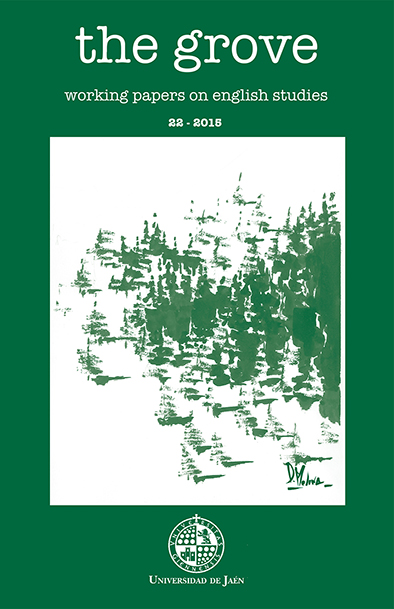Female Figures of the Jazz Age in Dorothy Parker’s Short Stories
Abstract
Most criticism on Dorothy Parker (1893–1967) highlights her literary persona only to the detriment of the study of a profuse work comprising six decades of narrative, poetry and drama. Probably her best-known contribution to literature was her condition of the voice of the Jazz Age generation, shifting from acquiescence to irony. A corpus of Parker’s short stories written in the 1920s and early 1930s will be analyzed from feminist perspectives, such as those by Pettit, Melzer or Showalter, in terms of ‘appearance’, ‘social life’ and ‘bonds with men’ to determine whether her heroines respond to the stereotype of the flapper in the Roaring Twenties. Results show a satirized viewpoint conveying dissatisfaction regarding body, idleness and romance predicting many of the conflicts of women in the second half of the XXth Century.
Key words: Dorothy Parker, short stories, flappers, Jazz Age, feminist criticism, body, satire.
EL PERSONAJE FEMENINO DE LA JAZZ AGE EN LOS RELATOS DE DOROTHY PARKER
Resumen
La mayor parte de los estudios sobre Dorothy Parker (1893–1967) se centran en su condición de personalidad del panorama escénico en detrimento de su profusa obra, con más de seis decenios de narrativa, poesía y teatro. Probablemente su contribución más reconocida sea haber dado voz a la generación de la Era del Jazz, con una visión que oscila entre la complicidad y la ironía. Las heroínas del corpus de relatos escritos por Parker en los años veinte y treinta serán analizadas bajo perspectivas feministas (Pettit, Melzer, Showalter) en términos de ‘apariencia’, ‘vida social’ y ‘relación con los hombres’ para determinar si se acomodan al estereotipo de la flapper. Los resultados muestran una sátira del modelo insatisfecho con su cuerpo y la vacuidad de su vida y amoríos que anuncia conflictos femeninos de la segunda mitad del siglo XX.
Palabras clave: Dorothy Parker, relatos, flappers, Era del Jazz, crítica feminista, cuerpo, sátira.
Downloads
References
Adams, Franklin Pierce. The diary of our own Samuel Pepys. Vols. 1 & 2. New York: Simon & Schuster, 1935.
Curnutt, Kirk. The Cambridge introduction to F. Scott Fitzgerald. 2004. 2nd ed. Cambridge: Cambridge University Press, 2007.
Fitzpatrick, Kevin. Interview: Stuart Y. Silverstein: Q & A. (1999). Web. 22 Jul 2015. <http://www.dorothyparker.com/interview.htm>
Frederickson, David. You might as well live. A play with a jazz trio, about Dorothy Parker. Unpublished manuscript.
Frewin, Leslie. The late Mrs. Dorothy Parker. New York: Macmillan, 1986.
Gaines, James R. Wit’s End: The days and nights of the Algonquin Round Table. New York: Harcourt, Brace & Jovanovich, 1977.
Goulet, Darin Patrick. Not much fun: A musical adapted from Dorothy Parker. 1997. Unpublished manuscript, Harvard University.
Kinney, Arthur F. Dorothy Parker. Boston: Twayne Publishers, 1978.
Meade, Marion. What Fresh Hell Is This? 1988. 2nd ed. New York: Penguin, Random House, 1988.
Melzer, Sondra R., ed. The rhetoric of rage: Women in Dorothy Parker. New York: Peter Lang, 2001.
Mencken, Henry Louis. "The flapper". The Smart Set: A Magazine of Cleverness 2 (1915): 1–2.
Millay, Edna St Vincent. A few figs from thistles. New York: Harper & Brothers, 1922.
Miller, Nina. Making love modern. The intimate public worlds of New York’s literary women. New York: Oxford University Press, 1999.
Millier, Brett C. Flawed light: American women poets and alcohol. Urbana, IL: University of Illinois, 2009.
Parker, Dorothy. “The flapper”. The New York Life January 26 (1922): 22.
---. “News item”. The New York World August 16 (1925): 11.
---. Not as deep as a well: Collected poems. New York: The Viking Press, 1936.
---. Not much fun. The lost poems of Dorothy Parker. Compiled and with an Introduction by Stuart Y. Silverstein. New York: Scribner, 1996.
---. Complete stories. Colleen Breese, ed. Introduction by Regina Barreca. 1995. New York: Penguin Books, 2003.
---. The portable Dorothy Parker. Marion Meade, ed. New York: Penguin, 2006.
Parker, Dorothy & Arnaud d’Usseau. 1954. The ladies of the corridor. With an Introduction by M. Meade. New York: Penguin Classics, 2008.
Patmore, Coventry Kersey Dighton. The angel in the house. London: G. Bell & Son, 1897.
Pettit, Rhonda S. A gendered collision: Sentimentalism and Modernism in Dorothy Parker’s poetry and fiction. Madison, NJ: Fairleigh Dickinson University Press; London: Associated University Presses, 2000.
---. The critical waltz: Essays on the work of Dorothy Parker. Madison, NJ: Fairleigh Dickinson University Press, 2005.
Rubinstein, Annette T. “Dorothy Parker deserves better”. Monthly Review. Vol. 40.8 (1989): 52.
Showalter, Elaine. A jury of her peers. American women writers from Anne Bradstreet to Annie Proulx. London: Virago, 2009.
The Dorothy Parker Society: Dorothy Parker’s New York (Dot City) Web. 20 Jul. 2015 <http://www.dorothyparker.com/about.html>
Treichler, Paula A. “Trapped like a Trap in a Trap”. Language and Style 13:4 (1980). In Rhonda S. Pettit, ed. The critical waltz: Essays on the work of Dorothy Parker. Madison, NJ: Fairleigh Dickinson University Press, 2005: 166–86.
Thusing, Jenniffer. No sense saying goodnight, an adaptation of Dorothy Parker’s stories. Unpublished manuscript, 2004.
Villena, Luis Antonio de. “Dorothy Parker. Marion Meade”. 2000. ElCultural.es. 20 Jul. 2015.
Wilson, Edmund. “A Toast and a Tear for Dorothy Parker”. The New Yorker 20 May (1944): 67-68.
Published
How to Cite
Issue
Section
License
Authors who publish with this journal agree to retain copyright and grant the journal right of first publication with the work simultaneously licensed under a Creative Commons Attribution License that allows others to share the work with an acknowledgement of the work's authorship and initial publication in this journal. Also, authors will retain the rights on their work, even if they will be granting The Grove. Working Papers on English Studies a non-exclusive right of use to reproduce, edit, distribute, publicly communicate and show their work. Therefore, authors are free to engage in additional, independent contracts for non-exclusive distribution of the works published in this journal (such as uploading them to an institutional repository or publishing them in a book), as long as the fact that the manuscripts were first published in this journal is acknowledged.
















